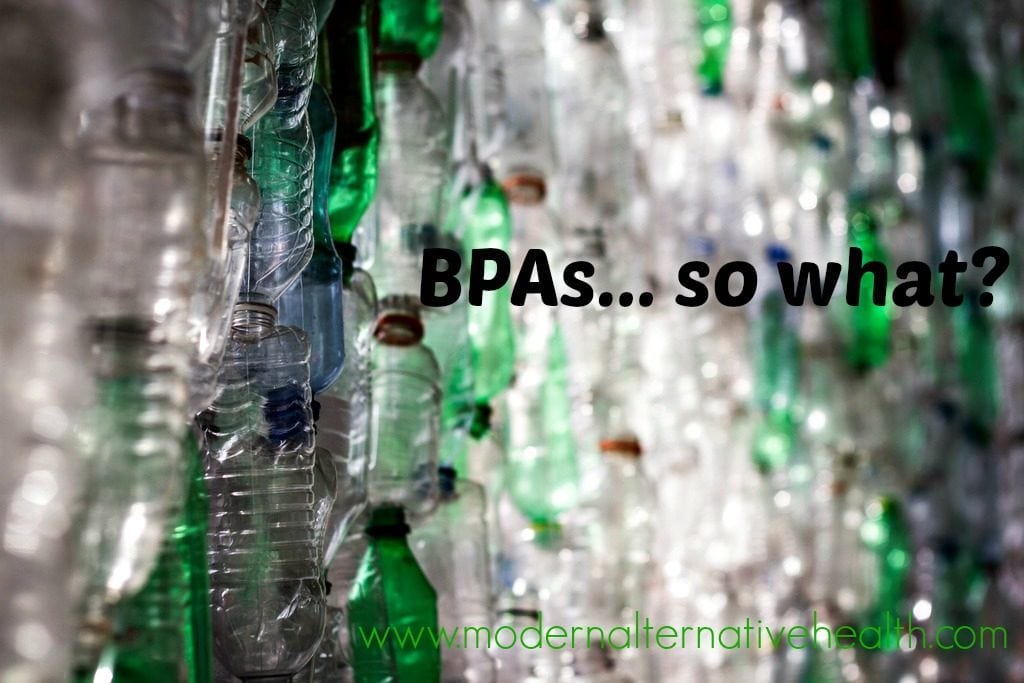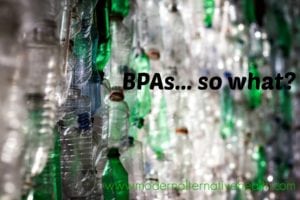Most of us have heard the term “BPA” at one time or another especially since information about its dangers debuted in the news several years ago. What exactly is a BPA and why should we care?
First, BPA (Bisphenol-A) is a man-made chemical generally found in plastics. The biggest health concern attached to it is its ability to disrupt human hormones, particularly estrogen. As early puberty, infertility, reproductive cancers, and health problems are on the rise, researchers have been looking into BPAs role in this crisis.
BPAs are thought to be particularly harmful to children as their bodies are still developing and are more susceptible to chemicals. For this reason, the top five baby bottle manufacturing companies have ceased using BPA materials in their bottles. (Breastfeeding: The original BPA free bottle.)
As you seek to rid your home of BPAs and limit the exposure for both yourself and your family, consider these practical ways to keep BPAs away:
1. Use glass. Instead of using plastic tupperware storage containers, water bottles, and dishes, use glass. Mason jars are a handy storage alternative which can be used as drinking glasses or storage containers, and there are numerous popular brands of glass tuppperware-style alternative storage containers on the market. Even sippy-cups for young children can be glass with a silicon sleeve protector that protects them from breaking.
2. Don’t microwave in plastic. If you do choose to use plastic storage containers, transfer your food to a glass container before you heat it in the microwave. Microwaving causes the plastic to warm up and leach BPAs right into your food. This can be a very dangerous way to put extra chemicals from the plastic right into your body, so use glass instead. Better yet, don’t microwave at all! (Learn more here.) Though I admit I am not 100% microwave free, I do make a conscious effort to use glass if I use the microwave.
3. Ditch cans. Most canned foods, even organic ones, are processed in cans lined with BPAs. So, unless you’re buying a canned good that is specifically labeled “BPA FREE”, the food in the can is likely BPA contaminated. Preserve your own fruit, vegetables, and even beans using home canning methods and glass jars. This not only saves you money, but also limits your BPA exposure. Hopefully you’re not drinking soda or beer, but their cans also pose risk for BPA. If you’re trying to quit soda, try making your own delicious water kefir instead in BPA free glass mason jars!
4. Choose BPA free plastics. Plastic products aren’t all bad. I take my Nalgene plastic bottle everywhere, as a glass water bottle for sports just isn’t practical for me, but it is BPA free and I’m careful not to put hot liquids in it. Choose plastic items with the recycling codes #1, #2, or #4 listed on them. Many companies have even started printing “BPA FREE” on a sticker placed right on their product. Remember that BPAs aren’t just found in water bottles or tupperware containers. Lurking in your children’s lego toys, the plastic bags from the grocery store, and other items are BPAs.
5. Say no to tampons. I understand the plastic tampon applicator is only in your body for a few seconds each time you insert a tampon… BUT if you’re an “average” woman, inserting eighteen or twenty tampons per month, your BPA exposure adds up. Not to mention, this particular type of plastic is being put in one of the most sensitive areas of your body. (There are a host of other issues with tampons and even pads, so see here for more information.) Try a BPA free menstrual cup (I like the Softcup), natural disposable pads, or cloth.
As you seek to rid your body of harmful substances, consider limiting BPAs is more practical than it may sound.








[…] cans that contain BPAs. For more complete information about why avoiding BPAs is important, read this. When you can your own produce, you likely use glass Mason jars, which neither contain BPAs nor […]